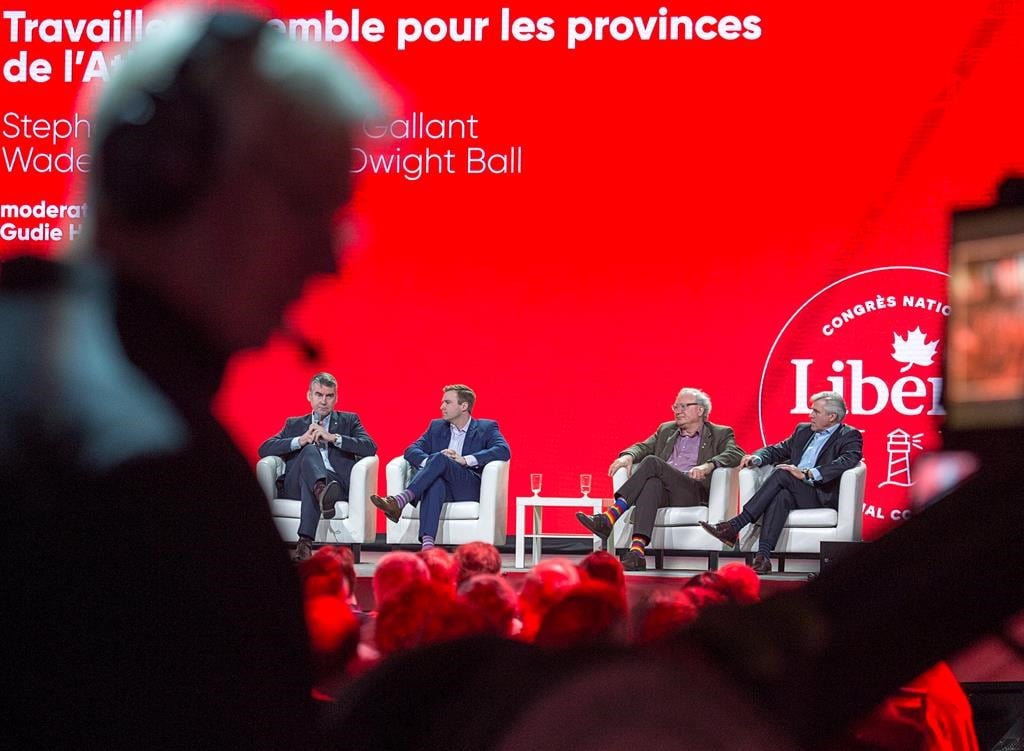Support strong Canadian climate journalism for 2025
Justin Trudeau unleashed a blistering attack on Andrew Scheer and the Conservatives Saturday, in a partisan stemwinder aimed at firing up Liberal troops as they prepare for a federal election next year.
The prime minister's speech at the ruling party's national convention had all the hallmarks of an election rally, complete with a boom camera swooping around the room to capture the rapturous response of some 3,000 boisterous, cheering, placard-waving Liberals — footage that seems destined for a future campaign ad.
And Trudeau made it clear the speech is a harbinger of things to come when the 2019 campaign does kick off, saying he intends to aggressively defend his government's record and counter what he termed the "politics of fear and division" practised by his opponents.
While Trudeau focused on the Conservatives, grassroots Liberals appeared more intent on ensuring the party isn't outflanked on the left by the NDP, choosing a host of progressive resolutions as priorities they would like to see in the coming election platform.
Their top priorities were to expand universal health care to cover prescription drugs and mental health services, decriminalize simple possession and consumption of all illegal drugs and decriminalize prostitution.
However, none of the resolutions are binding. And while Trudeau welcomed the pharmacare priority, which his government has already signalled is in the works, he was non-commital about the prostitution resolution and nixed decriminalization of hard drugs as "not part of our plans."
Nevertheless, citing his government's agenda thus far — including cutting taxes for middle-income earners while hiking them for the wealthiest — Trudeau said: "It won't come as any surprise to people that I deeply believe that we are and should be a progressive party."
In his speech, Trudeau charged that the Conservatives have learned nothing from their 2015 defeat and are continuing with the same negative tactics and divisive policies that characterized their government under Stephen Harper. He noted that Tory leader Andrew Scheer has dubbed himself "Stephen Harper with a smile" — appearing to blame Harper's temperament for the Tory defeat.
"No, my friends, Stephen Harper's personal disposition didn't fail Canada. His policies did," Trudeau said.
"And if there's one thing — and there may be only one thing — we've learned about the Conservative party under Mr. Scheer's leadership, it's this: It may be Andrew Scheer's smile. But it's still Stephen Harper's party.
"The same policies. The same politics of fear and division."
Trudeau cited what he called the Conservatives' refusal to tackle climate change, their opposition to the Liberal government's tax changes and Scheer's leadership platform proposal to soften Canada's gun laws.
Despite his harsh assessment of Scheer and the Tories, Trudeau maintained that's consistent with his commitment to practise a more positive form of politics. He recounted how he refused to join the Conservatives "in the gutter" when they spent millions during the 2015 campaign to run personal attack ads depicting him as nothing more than a lightweight with nice hair.
"Sunny ways, my friends. Sunny ways," Trudeau said, repeating his mantra from the 2015 campaign.
"Positive politics means you fight for your ideas — you don't demonize your opponents."
Trudeau even went out of his way to repeat a line he first used in 2014: "Canadians who voted Conservative are not our enemies; they're our neighbours. We will fight for Canadians — all Canadians."
Speaking to reporters later, Trudeau spelled out where he draws the line between positive and negative political campaigning.
"I will always be very, very clear and unapologetic about where I disagree on policy, and on the choice to divide Canadians or play up the politics of fear or anger. But I won't engage in personal attacks," he said.
For instance, Trudeau said he "will not shy away" from highlighting that the Conservatives oppose his government's "common sense gun laws," while Scheer proposed during the Tory leadership race to allow larger ammunition magazines.
"These are the kinds of things that it is important to bring up so that Canadians can make informed choices when they get to the ballot box next year," he said.
"The politics of polarization, of fear, of aggressive nationalism, of a broad range of populism, are the kinds of things that don't end up serving a country and I think it's important to highlight those without going into personal attacks," he added, noting that it's the same approach he took in 2015.
Trudeau has evidently taken the advice of David Axelrod, senior adviser to former U.S. president Barack Obama, who advised Liberals on Friday that they will have to "push back hard" against their opponents in the next election.
Axelrod drew a similar line between positive and negative politics, saying it's important to make it clear to voters what their choices are. However, he added, "That is not to say that the politics of destruction is the way to go, that personal attacks, caustic attacks, politics that we've seen too much of in the United States of late is the way to go either."
In his speech, Trudeau tackled critics who complain his government is more about image than action.
"Tell that," he said, to the 300,000 kids lifted out of poverty through the enhanced child benefit or to the 618,000 Canadians who've found new jobs since 2015.
Among the 15 priorities chosen by Liberals for inclusion in the platform were resolutions calling for a guarantee minimum income, an employee pension protection strategy and a tunnel connecting the island of Newfoundland to the mainland.



Comments